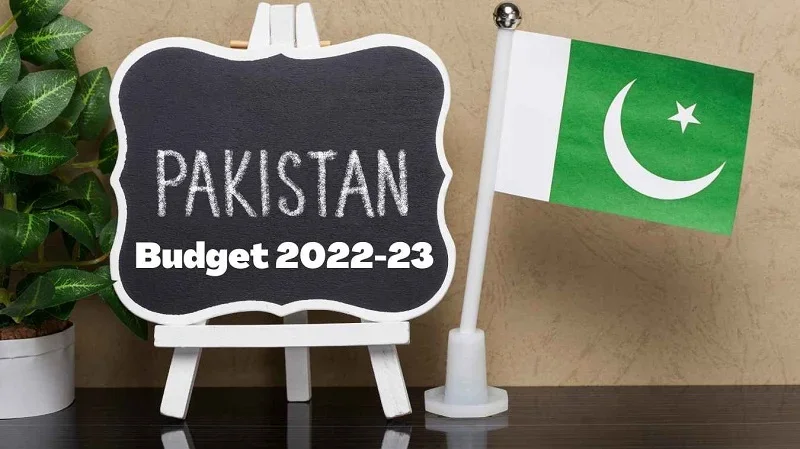Rs 2950 billion allocated for debt servicing, Rs 800 billion for PSDP, Rs 1,523 billion for defence expenditures, Rs 699 billion for targeted subsidies, Rs 550 billion for civil administration, and Rs 530 billion for pensions.
Amid an inherited severe financial crisis, the two-month-old coalition federal government on Friday announced a progressive and relief-oriented growth budget for the fiscal year 2022-23, with a total outlay of Rs 9.502 trillion to stabilize the ailing economy and lessen the sufferings of downtrodden segments of the society.
The budget specially focused on fiscal consolidation to curtail overall deficit, prioritizing practical austerity measures along with strategies to enhance tax-to-GDP (gross domestic product) ratio, curtail trade and current account deficits, and control inflation and tax leakages, protect vulnerability and promote sustainable economic growth.
Through the budget measures, the government had specially prioritized rejuvenating development programmes, eliminating power outages, boosting industrial and agriculture production for food security, banning luxury imports, reducing losses of public sector enterprises, and enhancing tax rates on wealthy persons.
Announcing the radical national development and pro-common man initiatives in the National Assembly, Minister for Finance and Revenue Miftah Ismail said the budget was being presented at a critical juncture as the previous government had caused huge damage to the economy during its three years and nine months tenure.
He said the government had embarked on introducing drastic measures in the Federal Budget 2022-23 to uplift and put the economy on a sustainable growth trajectory.
The finance minister said out of a total of Rs 9.502 trillion budget allocations, an amount of Rs 2,950 billion had been allocated for debt servicing whereas Rs 800 billion would be utilized for the Public Sector Development Programme (PSDP 2022-23).
He said an amount of Rs1,523 billion had been proposed for defence expenditures, Rs 550 billion for civil administration and Rs 530 billion for pensions. Similarly, Rs 699 billion had been proposed for providing targeted subsidies to the poor segments of society.
The revenue collection by FBR has been estimated at Rs 7,004 billion during the fiscal year 2022-23, out of which Rs 4,100 would be the provincial share.
He said the net tax revenues with the federal government had been estimated at Rs 4,904 billion whereas the non-tax revenues were projected at Rs 2,000 billion.
The finance minister while giving details of budgetary estimates for the current fiscal year (2021-22), said the total revenue collection would reach Rs 6,000 billion, out of which the share of the provinces would be Rs.3,512.
He said the net revenues of the federal government would be Rs 3,803 billion whereas the non-tax revenues were estimated at Rs 1,315 billion. The total expenditures of the current fiscal year had been estimated at Rs 9,118 billion whereas the PSDP expenditures would be Rs 550 billion and around Rs 3,144 would be the total amount of debt servicing during the current year.
For the upcoming budget for FY2023, the finance minister said the government proposed Rs 1,242 billion grants for the Benazir Income Support Programme (BISP) and other departments. The funds for the BISP had been increased from Rs 250 billion for 2021-22 to Rs 364 billion for 2022-23.
Moreover, Rs 12 billion had been earmarked for the provision of subsidy through the Utility Stores Corporation, with Rs 5 billion proposed for the Ramazan Package, he added.
The minister said around 9 million families would benefit from the BISP’s Kafalat Cash Transfer Programme for which Rs 266 billion had been proposed.
15% ad-hoc relief allowance announced in the basic salaries of the federal government employees, besides merging previous ad-hoc relief allowances in the basic pay.
He said Prime Minister Shehbaz Sharif wanted to give relief to the poor through targeted subsidies, so the government decided to impose a special tax on higher-income earnings.
The minister said the government would focus on increasing per acre production of different crops, especially the ones for extracting edible oil, besides strengthening the industrial sector for enhancing exports. “It will help achieve the precious foreign exchange and balance of payments on a sustainable basis.”
He stressed the need for better management of tax collection, while effectively tackling the issue of tax evasion that was rampant during the previous government.
As regards austerity measures, the minister said a drastic reduction in government expenditures as part of the budget for which concrete steps would be taken. There would be a complete ban on the purchase of official vehicles and furniture, except for development projects, he added.
40% cut has been proposed on the petrol quota of the federal cabinet members and govt. officials, besides a ban on foreign tours at public expense.
He said a medium-term macroeconomic framework had been devised to put the national economy on a consistent path of progress and development.
He said one of the biggest challenges faced by the country was to achieve at least a 5 percent GDP growth rate sans current account deficit, taking the GDP from Rs 6,700 billion to over Rs 7,800 billion.
The minister said the inflation stood at 11.7 percent which was the highest during the last 10 years and vowed to bring it down with improved fiscal and monetary policies.
He said the tax ratio would be lifted from the existing 8.6% to 9.2% in the next fiscal year.
Miftah Ismail said despite financial constraints, the government allocated Rs 65 billion for the Higher Education Commission (HEC).
Govt. will provide about 100,000 laptops to students across the country in easy installments.
Funds had been allocated for providing state-of-the-art equipment to upgrade engineering and technology education, he added.
Commenting on the strategy to tackle the climate change-related issues, he said a huge amount of Rs 38 billion would be utilized to address climate change, food security, and information technology (IT) needs.
He said the government planned to spend Rs 100 billion on constructing multipurpose dams, including Diamer-Bhasha, Mohmand, Dasu, and Nai Gaj dams, and command area projects.
Read More: Pakistan’s GDP jumps to 6pc in FY2021-22
Miftah said energy and water resources projects were interlinked and an allocation of Rs 183 billion had been made in the budget for them.
He said the government was committed to improving the healthcare delivery system and earmarked an amount of Rs 24 billion for the purpose, while complete tax exemption would be given to charity hospitals.
The minister announced the establishment of the National Youth Commission (NYC) for empowering young people through their socio-economic development. Multiple new schemes for the youth would be launched this year to enhance their participation in the development of the country, he added.
Over two million jobs would be created this year under the Youth Employment Policy. A scheme will be launched for providing interest-free loans amounting to Rs 500,000 to the youth for promoting entrepreneurship.
The young people could also get soft loans of up to Rs 25 million under the scheme, he said, adding a 25 percent quota was fixed for women.
The minister said the young women would be imparted skills in high-tech and other fields on priority. Youth development centers would also be set up across the country, which would enable them to access integrated job portals, he added.
Read More: Pakistan beats targets as govt unveils Economic Survey 2021-22
Keeping in view the importance of energy for the development of the country, he said the government had earmarked Rs 73 billion for the power sector as it was committed to bringing improvement in electricity generation, transmission, and distribution on priority.
He said it was proposed to exempt sales tax on import of solar panels and local supply, besides easy loans would be provided to consumers using less than 200 units for purchasing solar panels. It would not only help promote environment-friendly energy in the country but also reduce the import of expensive oil and gas.
Miftah said the government would soon announce a new gas tariff under which provision of the commodity to the industrial sector to be ensured at competitive rates as compared to other countries. It would help increase the country’s overall export volume, he added.
TAXATION MEASURES
Miftah Ismail, while talking about the taxation measures, said the coalition government intended to encourage and promote a progressive taxation system by bringing the potential persons and wealthy into the tax net rather than burdening the existing taxpayers in order to enhance revenue and increase spending on uplifting the social sector.
He said the main component of taxation policy for the next fiscal year was to increase reliance on direct taxes, including income tax and capital value-added tax, and taxing the non-productive assets.
He said there was a lack of suitable investment conditions as the existing taxation system was also not fully supported for entrepreneurship, rather it discouraged the investment.
The system, he said, facilitated investment in the real estate sector, which was not an encouraging sign for economic growth as it created hurdles in major sectors’ development.
Miftah said the gains made through non-productive investment were one of the major reasons for rising inflation and social unrest, and the government was determined to streamline the real estate to make it an engine of growth.
He said the government was committed to creating a business-friendly environment by simplifying the taxation system and bringing structural reforms.
Salaried class is given tax exemption from Rs 0.6 million to Rs 1.2 million to help address the economic problems of fixed-income groups.
He said the government proposed tax relief measures for business associations and associations of persons, including enhancing tax exemption from Rs 400,000 to Rs 600,000. He said the tax on the income of welfare certificates, including saving certificates and pensioners benefit accounts, was reduced from 10% to 5%.
The minister said the government also proposed fixed income and sales tax for small retailers, based on their electricity bills. It would make the registration and reporting system easy for the purpose.
The tax amount would range from Rs 3,000 to Rs 10,000 as being the final settlement, and the Federal Board of Revenue would not inquire about it, he added.
He said the industrial units and other businesses were allowed to adjust 50% of initial depreciation, which was an additional burden for them.
Govt. also proposed to enhance advance income tax on motor vehicles of up to 1600 cc. About 2% tax would be charged on electric vehicles, while a 100% increase was proposed in the tax rate for non-filers.
The government proposed to enhance the tax ratio on banking companies from 39% to 42%, he added.
He also proposed a 2% advanced income withholding tax on the money being sent abroad through credit cards, debit, and pre-paid cards, however, it would be adjustable against the payable tax. The indirect tax collection, he added, had a positive impact on the FBR’s overall revenue collection.
He said the government proposed to exempt the local and imported solar panels from the sales tax. The consumers using less than 200 units would be provided loan facilities by the local banks with repayment in easy installments.
He said the government also decided to withdraw sales tax on agriculture inputs and farm machinery
The minister said the government proposed to provide exemption on all facilities of hospitals, having the capacity of 50 beds, including electricity and other supplies. The government also proposed to withdraw customs duty on farm mechanization and logistics in order to provide relief to the farming communities.
He said there were about 400 tariff headings and for promoting the industrial growth in the country and the development of the industrial sector, all additional customs and regulatory duties were being rationalized. For the promotion of the textile sector in the country, the tariff structure of artificial yarn had also been rationalized.


